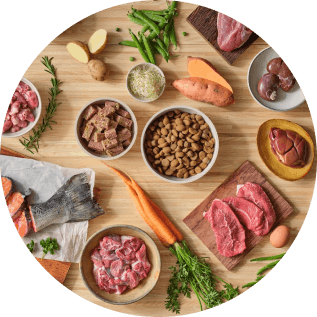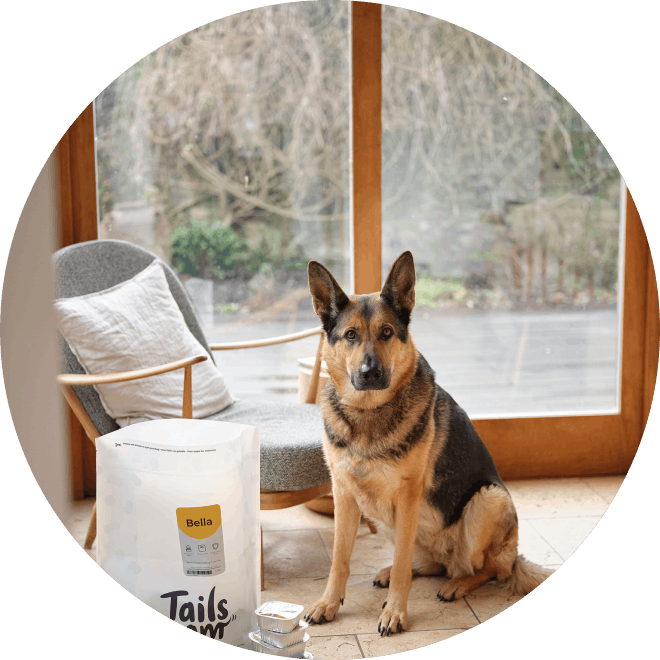A unique recipe tailored to your dog’s nutritional needs
Made without rice, oats or wheat
No added artificial colours, preservatives, or added sugar
Choosing a grain-free dog food recipe
We create a unique recipe for your dog, based on their age, breed, lifestyle, health and taste preferences. Just ask us to leave out the grain when you sign up, and we’ll do the rest*.

The right ingredients to supplement your dog’s diet
If you choose a grain-free recipe, we design your dog’s food without wheat, oats, or rice. Plus, we make sure your dog gets the right carbohydrates and nutrients from other sources instead – sweet potato, potato and beet pulp give them plenty of fibre and energy.

Choose what you’d like to exclude
Intolerances in dog food are often a reaction to specific ingredients, so trying a diet with no grain or wheat might be only part of the answer. If you are unsure about some ingredients, you can pick what you’d like us to leave out, like beef, dairy and eggs. Or, choose a hypoallergenic recipe and we’ll do the rest.
*Please note: while your recipe will be made without grain, it’ll be prepared in an environment that handles grains.
FAQs
Many pet parents wonder about grain-free food for their dogs. Here's the scoop: grain-free diets are only truly beneficial if your vet suspects a specific grain allergy. The truth is, actual grain allergies in dogs are quite rare. It's far more common for a dog to have an allergy to the protein source in their food, like chicken, beef, or fish. So, while grain-free sounds good, it's not a magic bullet unless there's a confirmed allergy.
Only if your dog is reacting to grains. It’s far more common for dogs to be allergic to something in their environment, like pollen, dust mites or flea bites. While wheat is a fairly common allergen for dogs, so are some protein sources, like beef or dairy, and chicken. If your dog is allergic to something other than grains, then a grain-free diet is unlikely to help. Your best bet is to work with your vet to work out the allergen your dog is reacting to.
Regular dog food typically includes grains like rice, wheat, corn, barley or oats. These are common carbohydrate sources that provide healthy energy. Grain-free dog food excludes these grains. These recipes tend to use ingredients like potatoes, sweet potatoes or legumes as the carbohydrate source instead. Both types of food can offer complete and balanced nutrition for your pup. The best choice often depends on your dog's individual needs and sensitivities, or simply what they prefer. For us, we don’t create regular dog food, because there’s no such thing as a regular dog. Each and every one is different. So we create 100% tailored meals for each and every one.
While they sound similar, wheat-free and grain-free aren't quite the same thing. Wheat is just one type of grain, along with rice, maize, oats and barley. So, when dog food is labelled "wheat-free," it simply means wheat has been excluded from that recipe. It might still contain other grains like rice or oats. Wheat is a gluten-containing grain, so this option is useful for dogs who might be gluten-sensitive. On the other hand, "grain-free" means all grains – including wheat, rice, maize, oats and barley – have been left out entirely.
Yes, that's right. Gluten is found only in certain grains. Not all grains contain it; for example, rice and maize are naturally gluten-free. This means that if a diet is grain-free, it will also be gluten-free.
Yes, grain-free dog food does contain fibre. Even without grains, fibre comes from other fantastic ingredients like legumes, potatoes, sweet potatoes and other wonderful vegetables.
You might have heard that grain-free dog food is easier on digestion, but actually, scientific research shows that grains are highly digestible for dogs. That being said, every dog is unique. While there's no evidence that grain-free is inherently better for digestion, some dogs just do better on a grain-free diet. Finding what works best for your furry friend can sometimes involve a little trial and error.
Most wet or raw grain-free foods might primarily contain just meat and vegetables, making them naturally lower in carbs. However, dry kibble needs some form of carbohydrate to hold its shape. So, grain-free dry diets often swap grains for ingredients like potato or sweet potato. This means that while they're grain-free, these kibbles might not necessarily be low in carbohydrates.
Yes, dogs can be allergic to grain-free food. The term "grain free" simply means grains are excluded from the recipe. Your dog could still be allergic to other components in the food. In fact, it's actually more common for dogs to be allergic to a meat or protein source than to grains themselves.
It can be tricky to figure out if your dog has a grain allergy. Why? Well, allergy tests aren't always reliable for pinpointing food sensitivities. The best way to know for sure is through an "exclusion diet." This involves working with a vet to feed your dog a very limited diet for a few weeks, then slowly reintroducing new foods one at a time to see what causes a reaction. The good news is most dogs aren't allergic to grains. However, if you suspect grains might be the problem, you could try a grain-free diet for about 4-6 weeks. If you see an improvement in your dog's symptoms during that time, grains might indeed have been the issue. If there's no change, then grains likely aren't the culprit, and you can explore other possibilities.
Choosing the right food for your new puppy can feel like a big decision, and you might be wondering about grain-free options. Puppies don't need a grain-free diet. When they're born, they won't have developed allergies, so there's no inherent benefit to avoiding grains. Grains are actually a fantastic source of nutrients like fibre, energy and essential minerals such as iron, zinc, and manganese – and they're easy for puppies to digest. Of course, other carbohydrates like potato, sweet potato and legumes can also provide excellent energy and nutrients. Ultimately, grain-free isn't superior to grain-containing food for puppies, or vice versa. It truly comes down to your personal preference as an owner and, most importantly, what your puppy loves to eat.
